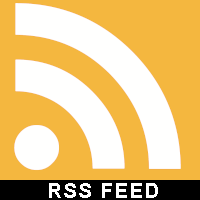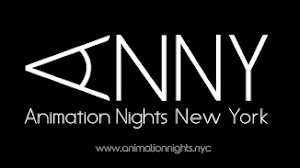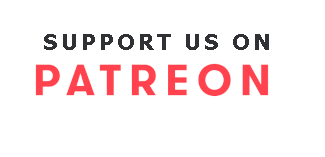In Conversation with Jamil Lahham, Director of 'Dirty Laundry Day'.
Jamil Lahham is a Syrian-American director and animator who has worked on multiple featured titles including Cloudy With A Chance of Meatballs and as the animation director on the Academy Award-winning short film "The Fantastic Flying Books Of Mr. Morris Lessmore.” Lahham recently screened his animated short, “Dirty Laundry Day” at ANNY. The short has been shown in film festivals all over the world, and won Best Animation at the 2015 Queens World Film Festival.
Noah Tavlin, ANNY [Animation Nights New York] Correspondent to Animation For Adults, discussed “Dirty Laundry Day” with Jamil Lahham.
AFA: What was your exposure to animation when you were growing up in Syria? What did you watch that made you interested in animation?
JL: Growing up in Syria, we were exposed to animation from East Asia—Chinese animation, Korean—but not the good stuff. We would get a limited amount of obscure animated TV shows. My fellow American animators wouldn't have even heard of the titles, they were so backwards and primitive. A lot of talking animals losing their parents and going on a journey to find or save them or whatever. And we had European stuff too. The only American animation we grew up watching was some of the classic Warner Brothers cartoons. We were familiar with Bugs Bunny, Tom & Jerry and Woody Woodpecker.
And you moved to the US to study animation?
Not necessarily for that reason. What happened was, my family was slowly petitioning to come to the US, and I just happened to be next in line. By the time I was ready and able to come here, it was 2002. I was enrolled in an art school in Syria, majoring in interior design. Interior design became my introduction to animation. At that time, I didn't even know 3D existed. Slowly, some colleagues showed me 3D Studio Max and how it could be helpful for modeling interiors. That blew my mind. I was a kid in a candy store. Slowly I was introduced to the concept of animating and moving these models in space. That's when a lightbulb went off in my head for animation.
At that point in my life, I was slowly learning about myself. Interior design didn't seem like the thing for me. However, it was a very natural jump from interior design to animation. I needed to polish the knowledge I had taught myself, so I applied to Ringling College.
Based on “Dirty Laundry Day”, it is evident that you are a natural visual storyteller. Were you always interested in storytelling? Were you ever drawing comics or anything like that on the side?
At that point in my life, I was slowly learning about myself. Interior design didn't seem like the thing for me. However, it was a very natural jump from interior design to animation. I needed to polish the knowledge I had taught myself, so I applied to Ringling College.
Based on “Dirty Laundry Day”, it is evident that you are a natural visual storyteller. Were you always interested in storytelling? Were you ever drawing comics or anything like that on the side?
No, that all came in later. See, that's the sad part about growing up in a third world country. Even if, as a kid, you knew what you wanted, there was no way to know how to achieve it. Animation for us Syrian kids, it wasn’t an option. It's not there for you to consider. Art altogether is looked down upon. It's not considered a thing that a real man can pursue as a job. It's a strange, backwards mentality.
My brother and I were interested in drawing. Our father wanted us to learn painting; he wanted us to study more traditional, classical forms. He was keen on sending us to summer schools where they focused on drawing and painting. But storytelling, as an art form, wasn't even on the map.
The change machine in “Dirty Laundry Day” is a clever, lean visual device in the story. When you were developing the short, how was that idea developed?
The premise was based on George Carlin's one-liner joke "I put a dollar in a change machine, but nothing changed". He was a great man with a great one liner, and I just took it and built on it. When I heard the line, I thought, "it's perfect, now let me see if I can make it into a story.” Let's see if things can really change. What if something changes? And then doesn't change? Or changes in an unexpected way? How do we go about that?
At first, influenced by my day-to-day work, I was going to do something a little more commercial. The priority wasn’t to try and tell a story with a meaning or a purpose. Slowly—I guess I'm a slow learner—it took me a while to realize, this eye-candy short film is not what I am or what I want to do. It's wasn’t going to satisfy my itch.
It just so happened that at the same time, when I turned the story into something more serious, it was the tail end of Barak Obama's presidential campaign. He was literally talking about change. I felt like my environment was informing the development of the idea.
Soon after that, we hit the fiscal cliff and the recession. First thing every morning, I would check the news. It all seemed to be bad news. This had a very organic influence on me. I was taking in what was happening in the world.
Halfway through this process, the Arab Spring started. Right away, I was receiving video feed, and it was feeding the story. “Dirty Laundry Day” wasn't intended to be about Syria. It just so happened that I was making a story about change when my people back home started protesting in the street asking for change. Instead of change, they got bullets. For me, that solidified the validity of the idea for me.
It seems like it's implicit in the “Dirty Laundry Day”, when the machine says "Change isn't free," that we tend to forget this fact.
My brother and I were interested in drawing. Our father wanted us to learn painting; he wanted us to study more traditional, classical forms. He was keen on sending us to summer schools where they focused on drawing and painting. But storytelling, as an art form, wasn't even on the map.
The change machine in “Dirty Laundry Day” is a clever, lean visual device in the story. When you were developing the short, how was that idea developed?
The premise was based on George Carlin's one-liner joke "I put a dollar in a change machine, but nothing changed". He was a great man with a great one liner, and I just took it and built on it. When I heard the line, I thought, "it's perfect, now let me see if I can make it into a story.” Let's see if things can really change. What if something changes? And then doesn't change? Or changes in an unexpected way? How do we go about that?
At first, influenced by my day-to-day work, I was going to do something a little more commercial. The priority wasn’t to try and tell a story with a meaning or a purpose. Slowly—I guess I'm a slow learner—it took me a while to realize, this eye-candy short film is not what I am or what I want to do. It's wasn’t going to satisfy my itch.
It just so happened that at the same time, when I turned the story into something more serious, it was the tail end of Barak Obama's presidential campaign. He was literally talking about change. I felt like my environment was informing the development of the idea.
Soon after that, we hit the fiscal cliff and the recession. First thing every morning, I would check the news. It all seemed to be bad news. This had a very organic influence on me. I was taking in what was happening in the world.
Halfway through this process, the Arab Spring started. Right away, I was receiving video feed, and it was feeding the story. “Dirty Laundry Day” wasn't intended to be about Syria. It just so happened that I was making a story about change when my people back home started protesting in the street asking for change. Instead of change, they got bullets. For me, that solidified the validity of the idea for me.
It seems like it's implicit in the “Dirty Laundry Day”, when the machine says "Change isn't free," that we tend to forget this fact.
People expect change to happen overnight. By obtaining change, they forget that other things will have to change too. If you want cheaper gas, fine, but that means that more people will be enslaved in the Gulf trying to dig out oil, or whatever. Change always costs something. The consequence can be death. I do have a couple of Easter eggs in the short where I hint at the people who called for change.
Who is this short for? Is there a specific type of audience you have in mind?
Who is this short for? Is there a specific type of audience you have in mind?
First and foremost, it’s for me. I don’t want to sound conceited or anything. The seed for the whole idea came after I started my first job at Sony Pictures ImageWorks in California. I landed a job in feature film. I felt like the king of the world. I mean think about it—you graduate, and right away, people come knocking on your door to work on a film like Cloudy With a Chance of Meatballs. It was amazing. I soon learned that I wasn't as happy as I thought I would be. Working in a well-oiled machine makes you expendable. You don't have any input on the project. Even if you have an idea, no one is there to listen to it. So you feel detached from the work no matter how cool, how historic it will one day become.
When I started thinking about making the short, it was about making it for myself. It was about seeing if I could pull off my own vision. I wanted it to be something that I would want to watch. So people like me would be one audience.
After myself, I suppose the audience I would want is people who are thirsty to learn from their entertainment. People who look for meaning in entertainment, not just gags and furry animals.
When I started thinking about making the short, it was about making it for myself. It was about seeing if I could pull off my own vision. I wanted it to be something that I would want to watch. So people like me would be one audience.
After myself, I suppose the audience I would want is people who are thirsty to learn from their entertainment. People who look for meaning in entertainment, not just gags and furry animals.
The statement "Change isn't free” is obviously a political statement, but it's not partisan. It's true for both the right and the left. Statements that are political but not partisan are becoming rare. Do you feel an obligation to cut through partisan divides in the short? Did you have to make a deliberate attempt to subdue your own political biases? Or did it come naturally from the material?
I intentionally did not take sides. The way I approach stories, as I was taught in school, you need a hook to catch your audience, and then slowly tell them what you want to tell them. Once you have your audience’s approval, then you can talk to them and they'll listen. By ramping up the pace slowly—he’s having a hard day, one bad thing after another, and then things start to change, there's a dick joke—this takes people on the journey with you. They trust that you're not trying to preach. Everyone is hungry for change on both sides of the political divide.
Putting one's own opinions on the back burner in order to make your work credible to people who come from different places or have different opinions can be a source of power for an artist or storyteller. It gives the storyteller so much credibility and authority.
Putting one's own opinions on the back burner in order to make your work credible to people who come from different places or have different opinions can be a source of power for an artist or storyteller. It gives the storyteller so much credibility and authority.
I didn't want to be shunned away or branded as a leftist or a right-winger or whatever. It's a story that's symbolically talking about something deeper. Obviously, I don't expect everyone to accept it.
Are you currently working on another short or personal project?
Are you currently working on another short or personal project?
I'm in the seed phase. I have an idea. This time I'm going very vanilla. I want to make directing my career. Making “Dirty Laundry Day” is only good for my own sanity. I need to prove myself as a master vanilla-maker so I can be trusted as a director for a versatile set of more commercial projects. I'm planning a cute little story about a little girl and her giant dog. They go on a little weird adventure in a fairground. I'll probably do it in 3D this time.
Something that's more of a showcase.
Yeah. I make serious stuff for those who are serious, but I can also make cute stuff too.
Is there a piece of animation that you think is underrated or under-seen? That you think other animators and fans of animation should watch?
Something that's more of a showcase.
Yeah. I make serious stuff for those who are serious, but I can also make cute stuff too.
Is there a piece of animation that you think is underrated or under-seen? That you think other animators and fans of animation should watch?
The Gloaming is about the concept of God; how God was made and how God made humans. It’s so gripping, I love it. Another one is, The Dot and the Line: A Romance in Lower Mathematics by Chuck Jones. It's just pure animation fun. He boiled down his style to an animated line and an animated dot. They have so much personality, it's not even funny.
Another awesome short is called “Jazzed”, directed by Anton Setola. It's so good, it makes me feel bad. I watched Jazzed and I know I'm not worthy of animating. It inspires me to work harder. The simplification of light and shapes is amazing
Jamil Lahham is a New York-based animator and director You can find his other work here, and you can follow him on Twitter here.
Noah Tavlin is a New York-based writer and ANNY’s Correspondent for AFA. You can follow Noah on Twitter here, and you can follow ANNY on Twitter and Facebook for more information about their monthly independent animation screenings.
Another awesome short is called “Jazzed”, directed by Anton Setola. It's so good, it makes me feel bad. I watched Jazzed and I know I'm not worthy of animating. It inspires me to work harder. The simplification of light and shapes is amazing
Jamil Lahham is a New York-based animator and director You can find his other work here, and you can follow him on Twitter here.
Noah Tavlin is a New York-based writer and ANNY’s Correspondent for AFA. You can follow Noah on Twitter here, and you can follow ANNY on Twitter and Facebook for more information about their monthly independent animation screenings.

























